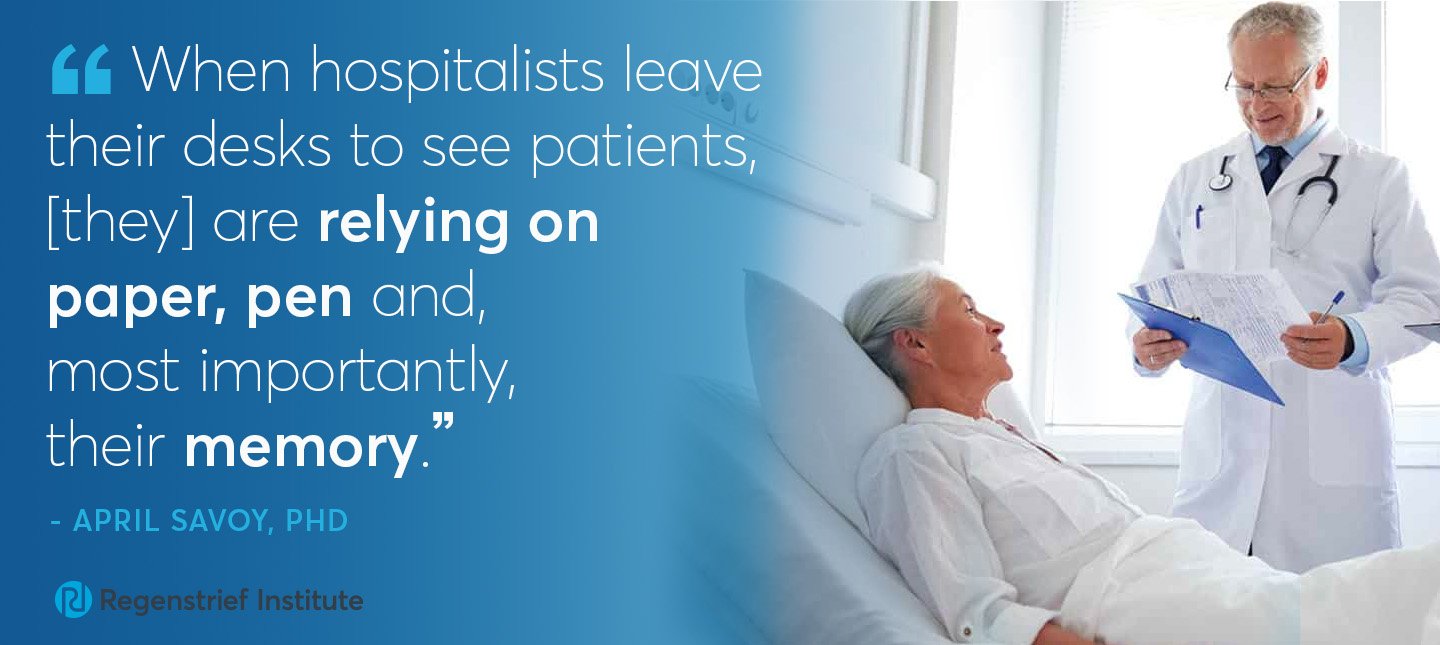Human factors study calls for user-centered design of specialized apps
As hospitalists – physicians who provide general medical care to hospitalized patients – become increasingly common, a new study provides a better understanding of both missed and potential opportunities for integrating mobile technology, such as cell phones, tablets and applications (apps) into hospitalists’ workflows to improve patient care.
“Healthcare systems across the country have invested heavily in health information technology [HIT], but when it comes to the mobile technology provided to hospitalists, HIT hasn’t incorporated many user-centered designs,“ said study corresponding author and human factors engineer April Savoy, PhD, a Regenstrief Institute and U.S. Department of Veteran’s Affairs researcher and a Purdue School of Engineering and Technology at IUPUI faculty member. “Cell phones work well for ordering a ride form a car service or posting social media because their apps are designed for the consumers these companies wish to reach. But we found a lack of user-focused mobile technology apps designed to decrease difficulty and increase efficiency of hospitalists’ workflows and improve patient care.
“We determined that when hospitalists leave their desks to see patients, these hard-working physicians are relying upon paper, pen and, most importantly, their memory,” Dr. Savoy noted. This reliance on memory contributes to the cognitive load of daily work and can threaten patient safety. With the increasing volume and acuity of patients everywhere, ways to improve day to day care in the hospital are urgently needed. “During rounds, hospitalists don’t use mobile technology because it’s not user focused. It lacks apps that are easy to use on small screens without keyboards because most healthcare systems haven’t figured out how to make mobile devices accessible when and where needed and haven’t solved such basic issues like battery life and device sanitation.”
After mapping out workflows and interviewing hospitalists, the study authors identified tasks that were most frequent, redundant or most difficult from the providers’ perspective and posited potential solutions including types of apps that could be prioritized to address issues and provide solutions. Based on their analysis they concluded that mobile apps focused on data entry and presentation supporting specific tasks should also be prioritized.
“Clinician perspectives on unmet needs for mobile technology among hospitalists: workflow analysis based on semi-structured interviews” is published online in JMIR Human Factors. The study, which was funded by the Department of Veterans Affairs, was conducted to inform the design and implementation processes of future health information technologies to improve continuity in hospital-based medicine and ultimately patient care.
Authors in addition to Dr. Savoy, are former Regenstrief Institute Research Scientist Jason Saleem, PhD, now of the J.B. Speed School of Engineering, University of Louisville; Barry C. Barker and Himalaya Patel, PhD, of the Richard L. Roudebush Department of Veterans Affairs Medical Center’s Center for Health Information and Communication, and hospitalist Areeba Kara, M.D., of Indiana University School of Medicine and IU Health Physicians.
About April Savoy, PhD
In addition to her role as a research scientist at Regenstrief Institute, April Savoy, PhD, is the director of the U.S. Department of Veterans Affairs Health Services Research and Development Human-Computer Interaction and Simulation Laboratory, and a core investigator for the Center for Health Information and Communication, Richard L. Roudebush VA Medical Center. She is also an assistant professor of computer and information technology at Purdue School of Engineering and Technology at IUPUI.
About Regenstrief Institute
Founded in 1969 in Indianapolis, the Regenstrief Institute is a local, national and global leader dedicated to a world where better information empowers people to end disease and realize true health. A key research partner to Indiana University, Regenstrief and its research scientists are responsible for a growing number of major healthcare innovations and studies. Examples range from the development of global health information technology standards that enable the use and interoperability of electronic health records to improving patient-physician communications, to creating models of care that inform practice and improve the lives of patients around the globe.
Sam Regenstrief, a nationally successful entrepreneur from Connersville, Indiana, founded the institute with the goal of making healthcare more efficient and accessible for everyone. His vision continues to guide the institute’s research mission.
About Richard L. Roudebush Veterans Affairs (VA) Medical Center
Established in 1932, the Richard L. Roudebush VA Medical Center serves Veterans from across Indiana and western Illinois. The Roudebush VAMC is one of the largest and most complex medical centers in the Department of Veterans Affairs, and provides acute inpatient medical, surgical, psychiatric, rehabilitation, and neurological care to more than 60,000 Veterans annually. Some of the many services available to Veterans include emergency medicine, primary care, cardiac care, radiation oncology, audiology, community-based extended care and community VA clinics.
About the Purdue School of Engineering and Technology at IUPUI
The Purdue School of Engineering and Technology at IUPUI is regarded as one of America’s premier urban schools of engineering and technology. It offers undergraduate and graduate degree programs that prepare students for careers in a global economy, and is recognized regionally, nationally and internationally for its excellence in teaching and learning, research and creative activities, and community engagement.











